If you have the time, money, and stress-tolerance, DIY landlording can be very rewarding and enjoyable! We put together some of our top tips to help Landlords.
LANDLORDING RULE #1: A VACANT UNIT IS BETTER THAN A BAD TENANT!
Screening tenants is one of the most important steps that you can take as a property manager. Bad tenants can lead to damaged property, legal issues, and other stressful situations. Here are some of the things you should do to find good tenants:
- Check their credit score and make sure they have a good score.
- Run criminal and eviction checks.
- Verify all of the information that they provide you.
- Obtain references from previous landlords.
- Create a good, high-quality lease that will protect you should anything happen.
- Build your marketing and advertising strategy around your ideal tenants.
- Avoid renting to family members and friends. Those situations create unique problems that you want to avoid.
GIVE TENANTS COMFORT OF 24/7 ACCESS.
Your tenants will want you to be available 24/7 should any problems arise. Make sure that they always have a way to reach you or someone on your team at all hours, even in the middle of the night or on holidays. Provide a phone number, email address, or online support system that they can use whenever they need.
KNOW AND FOLLOW HOUSING LAWS.
There are some fair housing organizations who secretly call “for rent” ads looking for Landlords to say or do something that violates fair housing laws. One mistake could cost you DEARLY!! Make sure you understand the local, state, and federal laws that apply to being a landlord and follow all of them exactly. You may also want to hire a lawyer to help draft leases and stay compliant. While you may not need to keep a lawyer on retainer, it’s always helpful to have them review your paperwork.
REMEMBER THAT YOU’RE RUNNING A BUSINESS.
Whether being a landlord is your full-time career or a way to add supplemental income, it’s critical that you treat it like a business. Educate yourself on accounting, marketing, compliance, contracts, management, etc. Be exact with bookkeeping and keep a detailed record of vendors, purchases, and materials. Be willing to outsource what you cannot be an expert in. Invest in the tools that you need to help you be efficient and accurate.
GOOD PROPERTY CONDITION ATTRACTS GOOD TENANTS.
Each property has what we call a “ceiling” related to its area, condition, and the tenants it can attract. For example, you would be “over-improving” if you put granite countertops in an 800-sqft apartment and “under-improving” if you tried to get full market rent for a 2,000 sqft home with 1950’s, pink bathroom tile.
Your property is your product, so make sure that it’s ready for your tenants, based on its ceiling. Consider investing in staging before showing your property. It doesn’t necessarily need to be fully furnished if you’re not renting it that way, but little things like curtains on the windows and flowers on the kitchen island can go a long way in selling the home to potential renters.
Make sure to take care of your property, as well. Make the repairs needed to make it somewhere that your tenants will feel at home. Not only will this keep tenants happy, it will also attract better and higher-paying residents.
MAKE PAYING RENT EASY.
There is no excuse for late rent, period! Give your tenants multiple ways to pay rent – online or in person – and be a stickler about collecting rent on time. Ensure that collection and late fees are clear and outlined in your lease agreements so there’s no confusion!
FIND RELIABLE CONTRACTORS
As a landlord, there will be times that you’ll have to make repairs to your property and, unless you possess those skills, you’ll need to have affordable and DEPENDABLE contractors. Finding a good handyman is much easier said than done.
You’ll need one that can make himself available for things that might pop up during the night. Building a good, long-term relationship with a handyman will be extremely beneficial!
You’ll also need to keep up with the 4-season maintenance demands that weather can have on a property. This might include mowing the lawn, cleaning the gutters, removing snow or leaves, trimming/removing trees, etc, etc, etc. Know what potential issues each season might bring and account for those.
CONDUCT REGULAR INSPECTIONS, WITH ORGANIZED PICTURES AND DOCUMENTATION.
Make sure you visit your property a few times every year and thoroughly archive your property’s condition. This helps reduce/eliminate security deposit disputes, and maintain the property in good condition by catching small problems before they become major headaches!
But also make sure to give tenants plenty of notice in writing to respect their needs and privacy.
PREPARE YOURSELF FOR VACANCIES AND REPAIRS.
As a landlord, there will definitely be times in which you won’t have any tenants. Make sure that you have savings and make allowances for those times, since your overhead expenses will still continue regardless of occupancy.

